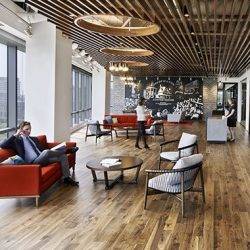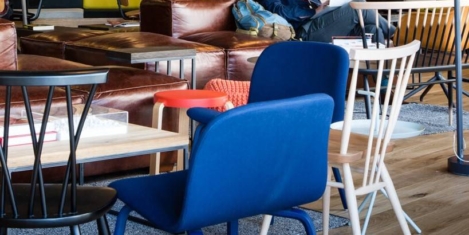February 9, 2018
London office market is booming and proving resilient in the face of Brexit
 A new report from Knight Frank claims that activity in the office market in London increased sharply last year, which the property adviser said was driven largely by growing demand from the UK’s burgeoning tech sector. The report said office leasing activity in central London hit 13.84 million sq ft last year, more than 2 million sq ft than in 2016. Knight Frank said it had seen ‘extraordinary demand’ for London offices from the Technology, Media and Telecommunications (TMT) sector. However, the report also claims that there is now a lack of quality office space supply because, despite the fact that more than 259 development schemes are under construction in Central London, 187 are residential, and of the remaining 72 offering commercial space, only two-thirds are available to lease, with many of them already pre-let to office tenants.
A new report from Knight Frank claims that activity in the office market in London increased sharply last year, which the property adviser said was driven largely by growing demand from the UK’s burgeoning tech sector. The report said office leasing activity in central London hit 13.84 million sq ft last year, more than 2 million sq ft than in 2016. Knight Frank said it had seen ‘extraordinary demand’ for London offices from the Technology, Media and Telecommunications (TMT) sector. However, the report also claims that there is now a lack of quality office space supply because, despite the fact that more than 259 development schemes are under construction in Central London, 187 are residential, and of the remaining 72 offering commercial space, only two-thirds are available to lease, with many of them already pre-let to office tenants.







 Demand for office space in Scotland’s three largest cities pushed overall take-up beyond 2m sq ft last year, aided by a solid final quarter of occupational deals in Aberdeen and Glasgow, and an all-time record year for Edinburgh. Scotland’s offices market in 2017 reach ed2.4 million sq ft, 14 percent above the 10 year average, according to the latest Scottish Office Spotlight from Savills. In Edinburgh (city centre and wider market) office take-up amounted to a record 1.1 million sq ft boosted by the ongoing growth of tech in the city. According to data from Stack Overflow, the Scottish capital saw a 19 percent increase in data scientists employed in the city centre over the course of 2017. Activity places further pressure on supply with only 220,000 sq ft of Grade A now available which Savills suggests will push top rents to £34 per sq ft in 2018. Keith Dobson, director in the business space agency team at Savills in Edinburgh, says: “The soon to be completed 40,000 sq ft office scheme at 2 Semple Street will ease pent up demand come Q2 2018, whilst The Mint Building and Capital Square will complete in 2019 and 2020 respectively.”
Demand for office space in Scotland’s three largest cities pushed overall take-up beyond 2m sq ft last year, aided by a solid final quarter of occupational deals in Aberdeen and Glasgow, and an all-time record year for Edinburgh. Scotland’s offices market in 2017 reach ed2.4 million sq ft, 14 percent above the 10 year average, according to the latest Scottish Office Spotlight from Savills. In Edinburgh (city centre and wider market) office take-up amounted to a record 1.1 million sq ft boosted by the ongoing growth of tech in the city. According to data from Stack Overflow, the Scottish capital saw a 19 percent increase in data scientists employed in the city centre over the course of 2017. Activity places further pressure on supply with only 220,000 sq ft of Grade A now available which Savills suggests will push top rents to £34 per sq ft in 2018. Keith Dobson, director in the business space agency team at Savills in Edinburgh, says: “The soon to be completed 40,000 sq ft office scheme at 2 Semple Street will ease pent up demand come Q2 2018, whilst The Mint Building and Capital Square will complete in 2019 and 2020 respectively.”
 Over half of UK workers (53 percent) say that the standard of technology is a key consideration for accepting a new job role and more than 1 in 3 (37 percent) would decline a job based on poor hardware alone, claims a new survey. The survey of over 2,000 British adults carried out by gadgets and technology e-tailer, LaptopsDirect.co.uk found that having the latest technology was valued more than other office perks, such as flexible working (45 percent), the working environment/decor (39 percent) and staff discounts (33 percent). Nearly a quarter of respondents (74 percent) overall, believe technology makes them more productive at work, with workers in marketing valuing technology the highest, with 84 percent of the votes, followed by those in creative and photographic (81 percent), information and communications (78 percent), professional services (73 percent) and education (71 percent).
Over half of UK workers (53 percent) say that the standard of technology is a key consideration for accepting a new job role and more than 1 in 3 (37 percent) would decline a job based on poor hardware alone, claims a new survey. The survey of over 2,000 British adults carried out by gadgets and technology e-tailer, LaptopsDirect.co.uk found that having the latest technology was valued more than other office perks, such as flexible working (45 percent), the working environment/decor (39 percent) and staff discounts (33 percent). Nearly a quarter of respondents (74 percent) overall, believe technology makes them more productive at work, with workers in marketing valuing technology the highest, with 84 percent of the votes, followed by those in creative and photographic (81 percent), information and communications (78 percent), professional services (73 percent) and education (71 percent).
 There have been 18 months of faltering net effective rents within the commercial office market in the Capital since the Brexit referendum, with ten of the 18 Central London office submarkets monitored in Cluttons’ latest London Office Market Outlook report registering rent falls in the final quarter of 2017, buoyed by additional incentives such as contributions to fit out costs and even delayed completions becoming commonplace in many locations. The report also raises concerns about the potential for an oversupply of serviced offices within the Capital. However, despite this and a perception that Central London offices are currently fully prices or possibly over-priced, by both occupiers and domestic investors, London remains a resilient city, continuing to attract high volumes of overseas capital. Employment growth is of course expected to be influenced by both the levels of GDP growth during 2018 and the Brexit divorce proceedings, which in turn will affect rental values. But says the report, aside from concerns over Brexit, there is no evidence from recruitment agencies to suggest a current, or planned exodus of finance and banking professionals from the City.
There have been 18 months of faltering net effective rents within the commercial office market in the Capital since the Brexit referendum, with ten of the 18 Central London office submarkets monitored in Cluttons’ latest London Office Market Outlook report registering rent falls in the final quarter of 2017, buoyed by additional incentives such as contributions to fit out costs and even delayed completions becoming commonplace in many locations. The report also raises concerns about the potential for an oversupply of serviced offices within the Capital. However, despite this and a perception that Central London offices are currently fully prices or possibly over-priced, by both occupiers and domestic investors, London remains a resilient city, continuing to attract high volumes of overseas capital. Employment growth is of course expected to be influenced by both the levels of GDP growth during 2018 and the Brexit divorce proceedings, which in turn will affect rental values. But says the report, aside from concerns over Brexit, there is no evidence from recruitment agencies to suggest a current, or planned exodus of finance and banking professionals from the City.


 Financial services organisations are reducing the amount of commercial office space they require as they adopt more flexible work styles. This is according to a new report from HOK’s US team,
Financial services organisations are reducing the amount of commercial office space they require as they adopt more flexible work styles. This is according to a new report from HOK’s US team, 















